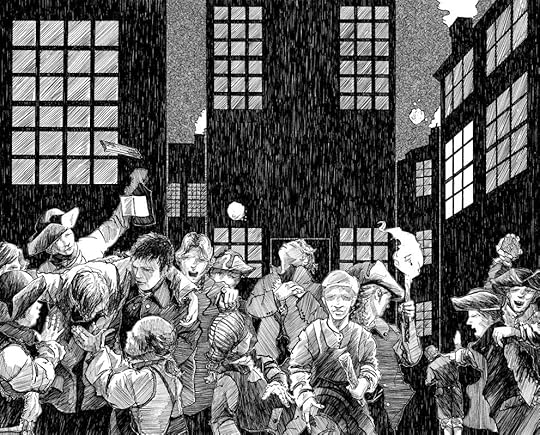Timothy Decker Interview: "The illustrations are so specific that you can, if you want to, use the silhouette images from the trial portion of the book and match them to the British soldiers in the massacre scenes."
 Tim Decker is, quite frankly, the best author/illustrator you have likely not heard of and that is an absolute shame. His deeply evocative picture books with their spare but powerful illustrations have stayed with me in ways I never expected. From The Letter Home to Run Far, Run Fast and especially For Liberty, they tell quiet stories about significant moments and command your attention from start to finish. Are they for children? Yes - my son love all of them. But they are equally for adults and truly do not know an age limit. They are special, more than anything, and that is why I continue to treasure them.
Tim Decker is, quite frankly, the best author/illustrator you have likely not heard of and that is an absolute shame. His deeply evocative picture books with their spare but powerful illustrations have stayed with me in ways I never expected. From The Letter Home to Run Far, Run Fast and especially For Liberty, they tell quiet stories about significant moments and command your attention from start to finish. Are they for children? Yes - my son love all of them. But they are equally for adults and truly do not know an age limit. They are special, more than anything, and that is why I continue to treasure them.
Tim's latest book is a YA graphic novel, The Punk Ethic. It is an illustrated novel (yea!) that tells the story of a musically inclined and deeply thoughtful teenage boy (Martin) and his friends, (smart, silly, foolish, perfect teenagers through and through), and the coolest girl ever (bass playing Holly). Martin wants to make a difference and that means making a lot of music and maybe, hopefully, becoming more than just friends with Holly. The ending is....amazing and unexpected and intense. It is also, I think, really something special. I hope The Punk Ethic helps Tim get the attention he deserves and also brings a lot of new readers to his stellar backlist.
*************************
CM: Your picture books cover such different subjects; were you interested in the wars and plague era for a long time or did you come to these with a desire to write/illustrate a book about them?
TD: I've always loved history, even when I was a little kid. I drew nothing but dinosaurs and WWII airplanes. At seven, I was going to be an archeologist. As a big kid, I can say that I'm interested in everything under the sun with the exception of practical mathematics, which bores me to tears. That said, my choice of subjects has more to do with how I feel about the current state of the world and less with my interest in history. The setting for my book is the sugar coating that hides my thoughts about contemporary issues. Right from the beginning, I've been concerned with how children process the over whelming mass of noise that is part of living in our media saturated time. Even if parents, educators or adults don't notice it, children are absorbing as much as they possibly can from the constant din produced by our televisions, radios and computers. Realizing that is now simply a fact of life, I set out to write books for children that address issues which others assume, incorrectly, have nothing to do with the world that children inhabit.
When I wrote The Letter Home, the war in Iraq had just turned from an idiotic invasion to an untenable occupation. It didn't take a genius to see that situation was going to become far more brutal and costly. For some reason, because I'm optimistic or naïve, I never expected to live through such turmoil. Which is just foolish, I guess. Because I'm an artist, making things is how I assert my opinion. So I wrote an anti-war book. I was working at a bookstore so I knew the sort of stuff that made it to shelves and I knew there was no way I could write an anti-war book about the current conflict because no one would publish it or buy it. I said to myself, when was the last really costly, mostly useless war that led to all kinds of social, economic and cultural problems in the Middle East and beyond? Ah... The Great War. What a mess that was... and fortunately for my purposes, how visually striking it was.
Run Far, Run Fast is me talking about noble and ignoble behavior, something which is hard to see in contemporary life, but stands out rather starkly in a world gone mad which was exactly what happened in the wake of the pestilence. For Liberty was my reaction to the Tea Party and other faux "grassroots" political groups that litter American culture and yet seem to know so little about the deceptively complicated philosophies that define our government. The Punk Ethic turned into way to express my ire about the nature of modern war and how acting locally can, possibly, change the world for the better. I guess that all of my books are written to show that the everything in the world is composed in shades of gray.



